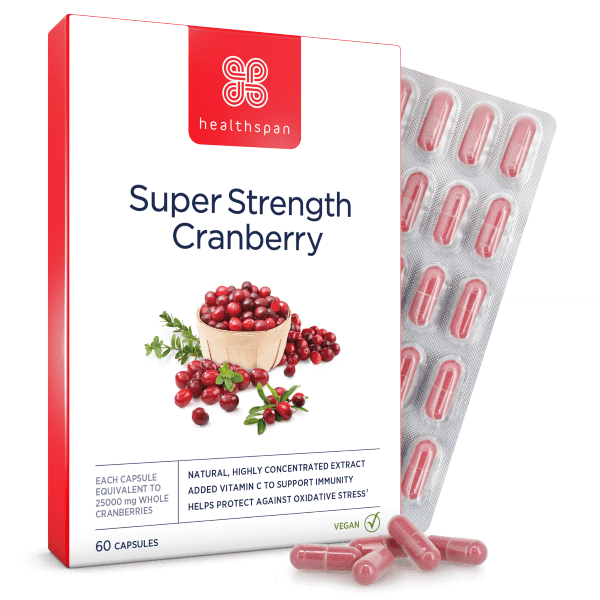This tiny red berry can be eaten dried, drunk as a juice or taken as an extract in supplement form and is best known for helping reduce urinary tract infections (UTIs).
🕒 3 min read
What is it?
A sour-tasting berry that is related to blueberries and bilberries. Cranberries are a rich source of antioxidants, vitamins and minerals including vitamin C, vitamin K, vitamin E and the mineral manganese.
How does it work?
Cranberries have anti-inflammatory effects thanks to the high amounts of antioxidants they contain (including anthocyanins and flavanols – the compounds that give the berries their dark red colour).
They also contain a unique phytonutrient known as A-type proanthocyanidins (PACs). It is this phytonutrient which, amongst other benefits, is said to prevent bacteria from attaching itself to the lining of the bladder wall and urinary tract (the cause of most UTIs).
What can it help?
Prevention of UTIs
These are some of the most common bacterial infections, particularly for women. They are typically caused by intestinal bacteria attaching itself to the inner surface of your bladder and urinary tract.
There is a considerable amount of research to show cranberry extract is particularly effective in reducing the risk for women who suffer with recurrent UTIs. One study involving over 500 older people found that taking a cranberry extract supplement twice daily reduced the incidence of UTIs.
It should be pointed out that its effects are preventative rather than offering a treatment for UTIs however – but if you are prone to getting UTIs taking a daily supplement can be really beneficial.
Gut health
The A-type proanthocyanidins found in cranberries have been found to help reduce the 'bad' bugs that live in the colon and there is some suggestion that cranberries could potentially help with colon and gastric cancers although more research is needed in this area.
Antibiotic resistance
When bacteria are treated with antibiotics (in the case of cystitis, for example) they often become resistant to its effects, but according to one study cranberry extract can actually prevent this resistance.
Heart health
A review from 2019 found that supplementing with cranberry extract helped to maintain healthy blood pressure.
The same review also suggested that cranberry supplements could help reduce BMI and improve levels of HDL 'good' cholesterol (known as 'good' because it helps remove other harmful forms of cholesterol from your bloodstream). High levels of HDL cholesterol can lower your risk of heart disease and stroke.
Tooth decay and gum disease
The A-type PACs contained in cranberries and other dark coloured berries are thought to help protect teeth from a type of bacteria that leads to tooth decay and cavities, according to research.
They are also thought to be helpful in preventing gum disease according to another study.
How safe is it?
Cranberry extract appears safe for most adults, although pregnant and breastfeeding women should consult their health professional before taking any supplement.
Eating too many cranberries or drinking too much cranberry juice can cause mild stomach upsets and diarrhoea in some.
Cranberry also contains high levels of oxalate, a chemical that can raise the risk of kidney stones in some people.

Super Strength Cranberry
Highly concentrated formulation
- 500mg concentrated cranberry powder
- Equivalent to 25,000mg whole fresh cranberries
- Added vitamin C to support immunity
Dosage
Cranberry extract is most often used in doses of 120-1600mg. There is no official recommended guidance on how much you should take.
Perfect partners
Probiotics. According to some research, taking cranberry extract with a probiotic can reduce the number, frequency and duration of UTIs in women.
Watchpoints
Cranberries contain a large amount of salicylic acid, which is similar to aspirin. If you are allergic to aspirin, avoid drinking large amounts of cranberry juice.
Cranberry is also known to interact with the blood thinner Warfarin. If you are taking any prescribed medication check here to see if cranberry could interact with what you are taking.







